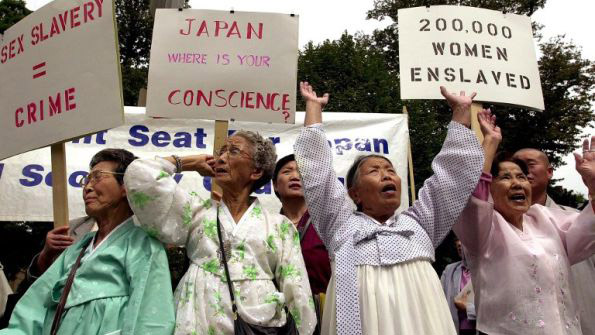
AS A young Japanese medical orderly with the Japanese imperial army, stationed in occupied China from 1943 to 1945, Masayoshi Matsumoto was ordered to help examine Korean women for venereal diseases. The women had been transported to the front to service Japanese troops, he says. When, deeper into the countryside, no military brothels were to hand, local women were rounded up and brought to makeshift brothels. Mr Matsumoto says the women were used like public toilets, with soldiers lining up to rape them. “They didn’t resist because they knew what would happen if they did,” he says.
Mr Matsumoto’s experiences occurred seven decades ago. Yet the dispute over those whom the Japanese refer to as “comfort women”— thousands of Asian women (largely from Korea, but also from Burma, China, Indonesia, the Philippines, Taiwan and elsewhere) herded into Japan’s wartime military brothels during the second world war—has festered. To President Barack Obama’s dismay, South Korea and Japan—America’s closest Asian allies—are today barely on speaking terms because they cannot agree on this history.
Japanese conservatives have repeatedly inflamed Korean public opinion by claiming the women were prostitutes who voluntarily provided “comfort” to frontline troops. Mr Obama has made crystal clear that he is among those who think otherwise. While steering clear of the topic during the Tokyo leg of his Asian trip last month, Mr Obama was quick to denounce the sexual enslavement during his two-day trip to Seoul, referring to it as a “terrible, egregious violation of human rights, “shocking” even in the midst of war.
Mr Obama also called for “an accurate and clear account of what happened”. His statement reportedly surprised the Japanese government. Katsunobu Kato, its deputy chief cabinet secretary, acknowledged the women’s “immeasurable pain and suffering” but said the issue “should not be made into a political or diplomatic subject”.
Mr Abe, of course, knows it already is. In March he appeared to take some of the sting out of the controversy when he said his government would not seek revision of an apology made by a cabinet official in 1993 that for the first time accepted the role of the Japanese army in setting up the wartime brothels. (The government had previously denied their existence.) on April 16th, and again this week, senior diplomats from Japan and South Korea met to discuss how Japan could more fully make amends. South Korea is seeking official apologies and proper compensation. But it is wary of Japan’s sincerity, says a senior South Korean government official: Mr Abe’s government has also pledged to “look into” the investigation that triggered that apology, an apparent sop to conservatives who have long cited inconsistencies in the testimony of the Korean victims.
First-hand evidence has mounted since some of the women broke their silence, in the early 1990s, after decades of shame. Now just 55 Korean former comfort women survive. one way out of the historical impasse may be to shift the probe to the perpetrators. Over the years, Japanese veterans of the second world war have repeatedly spoken out on the sex slaves issue. Mr Matsumoto, who was stationed in China’s Shanxi Province, is the latest—and perhaps last—to step forward. He calls attempts to deny the comfort women episode “outrageous”: “I saw these things with my own eyes. People who don’t look hard at what happened in the past will do the same thing again.” At 92, he says his health is fading and time is running out. Journalists from South Korea, China and Japan have made the pilgrimage to his home in west Tokyo to hear his story. His own government, though, has yet to visit.
(Picture credit: AFP)